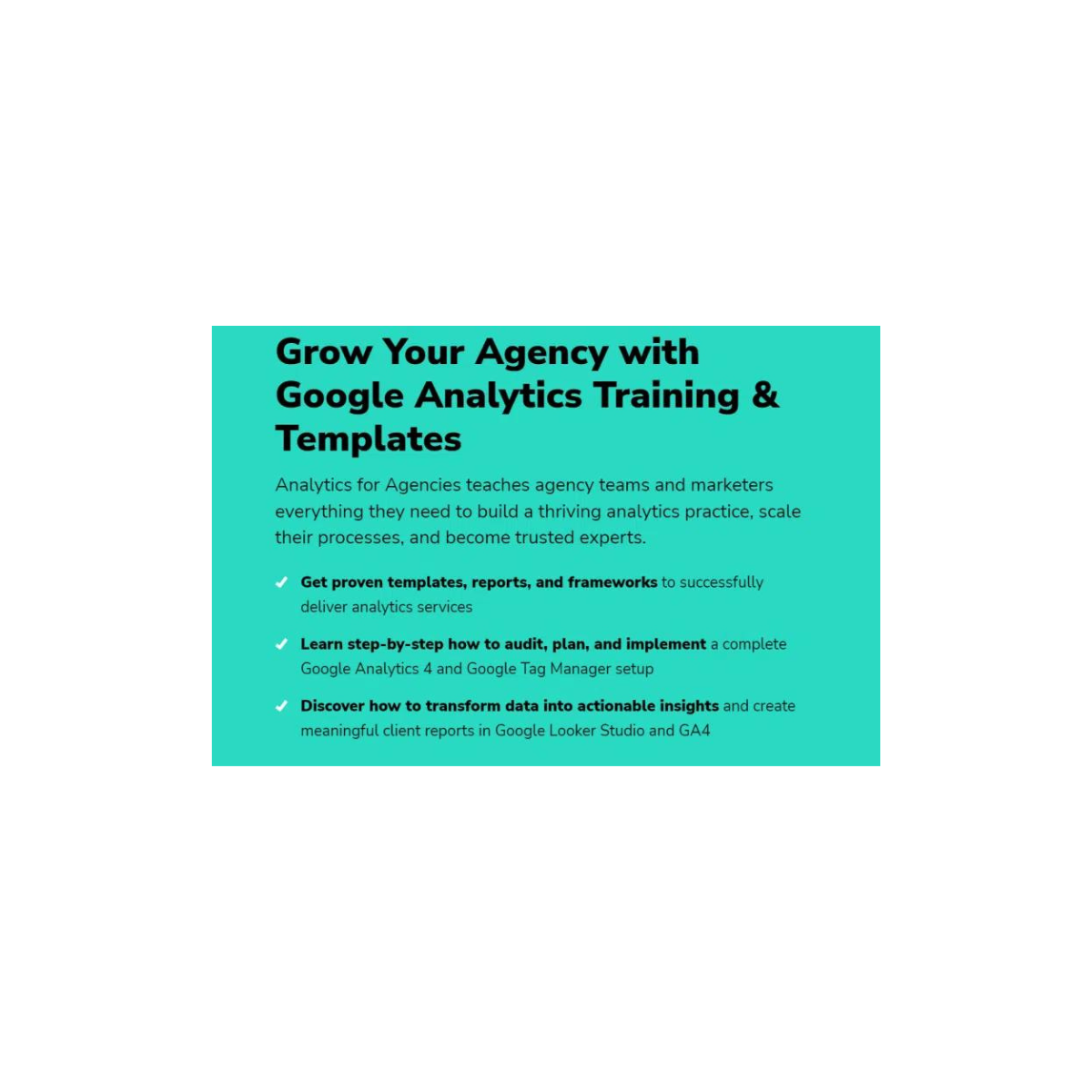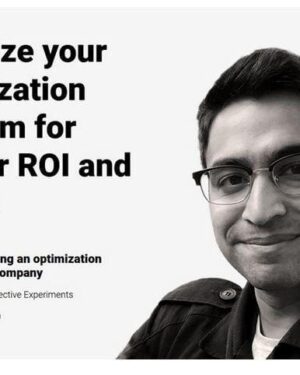Dana DiTomaso – Analytics for Agencies
Original price was: $598.00.$35.00Current price is: $35.00.
Description
There’s a solid reason why you’ve likely heard the term “data-driven decision-making” thrown about a lot lately. Data is the secret ingredient that may boost your agency’s effectiveness and provide your clients with outcomes that will astound them. It’s more than simply statistics on a screen. Prominent analytics expert Dana DiTomaso provides invaluable insights in “Dana DiTomaso – Analytics for Agencies”. Let’s explore her knowledge in-depth and discover how to apply analytics like an expert.
The Significance of Analytics
Let’s tackle the big issue before delving into the specifics of analytics: why are analytics so important to agencies? Put simply, analytics gives you a path forward. Your strategies are merely educated guesses without it.
The Advantage of Data-Driven
63% of businesses believe analytics are essential for successful digital marketing, according to the Digital Marketing Institute. Equipped with information, you can:
Determine what is and is not working.
Adapt your tactics to the actions of your target audience.
Organize your spending more skillfully.
Show your clients the ROI.
Analytics turns conjecture into accurate work. That is revolutionary.
Setting the Scene: Crucial Measures
Dana DiTomaso focuses on the metrics that are most important when she speaks about Analytics for Agencies. Since not all data are created equal, it is crucial to determine where to concentrate your attention.
Traffic Measurements
The first step to navigating the data-driven world is comprehending the traffic to your website. Here are a few crucial metrics to consider:
Pageviews: The quantity of views received by a particular page.
A set of online interactions that occur on your website within a predetermined amount of time is called a session.
Visitors who are specific: People who come to your website within a specific time frame.
Metrics of Engagement
Metrics measuring user engagement give you information about how people engage with your material. Important measurements consist of:
The percentage of visitors that leave a website after only reading one page is known as the “bounce rate.”
The average length of time a person spends on your website is called the average session duration.
The average number of pages viewed in a given session is called pages per session.
Gaining insight from these indicators can help you determine what appeals to your audience and adjust your approach accordingly.
Advancing Analytics: Elevating the Process
After you’ve grasped the fundamentals, it’s time to improve your analytical skills.
Optimization of Conversion Rate (CRO)
Any internet strategy’s lifeblood is conversions. Making sure that every element of your online presence is focused on converting visitors into customers is known as optimizing for conversions.
How to Increase CRO: A/B Testing Try out several iterations of your webpages to determine which works best.
Heatmaps: Programs such as Crazy Egg or Hotjar can display the locations of user clicks.
User Insights: User input through surveys and direct communication can be quite insightful.
Modeling of Attribution
Knowing which points of contact result in conversions can alter everything. You can monitor the customer journey and determine where to allocate your resources by using attribution modeling.
The Analytics’ Return on Investment
ROI is the main reason to invest in analytics, not only improved decision-making. Businesses that use data-driven marketing have a six-fold higher chance of generating profits year over year, according to Forrester Research. That statistic clearly says it all.
Instruments of the Trade
A blog on analytics wouldn’t be complete if it didn’t address the tools that enable everything. Dana DiTomaso frequently stresses how crucial it is to gather, process, and present data using the appropriate tools.
Essential Analytics Resources
The industry standard for monitoring and reporting website traffic is Google Analytics.
Measurement codes and associated code fragments can be easily updated with Google Tag Manager, a tag management system.
SEMrush: Excellent source of information about PPC, SEO, and content marketing effectiveness.
Tableau: For business insight and powerful data visualization.
Useful Applications
To wrap things off, let’s discuss a few actual instances of how agencies have used analytics.
Case Study: Increasing Customer Involvement
Think about an agency that serves a client in e-commerce. The firm finds out that a significant portion of customers abandon their carts during the checkout process by looking through the client’s Google Analytics data. They are able to dramatically increase revenue by reducing the abandonment rate by 20% by means of A/B testing various checkout page designs.
Improving Content Strategy, for instance
Analytics can be used by an agency to determine which blog entries are bringing in the most readers and comments. They may produce more focused content and eventually increase user engagement and time on site by concentrating on certain subjects and forms.
Typical Mistakes and How to Prevent Them
When it comes to analytics, mistakes can be made even by those with the greatest of intentions. Here are some typical dangers along with tips for avoiding them.
Disregarding Data Quality
Poor data causes poor decision-making. Make sure the techniques you use to collect data are reliable and accurate. To keep your data quality intact, audit it on a regular basis.
Neglecting Useful Information
Data is useless when used just for its own sake. Always seek out insights that can be put into practice. What can you do with the data you’ve gathered? Give top priority to activities that will result in quantifiable gains.
Concentrating on Vanity Measures
Although vanity metrics, such as following count, can appear great, they don’t always correspond to significant business results. Pay attention to measures that are directly related to your KPIs and goals.
Finale: Your Route to Expertise
Although being an analytics master takes time, you may accelerate your learning process by seeking advice from professionals like Dana DiTomaso. According to “Dana DiTomaso – Analytics for Agencies,” mastering analytics requires recognizing the significance of important metrics, utilizing cutting-edge strategies like CRO and attribution modeling, and avoiding typical mistakes.
Urge to Take Action
Are you prepared to go farther? See our in-depth information on advanced analytics methods here. There is always more to learn, regardless of how experienced you are with data or how new you are to it. Continue investigating and evaluating, and observe as your agency soars to new heights.
You’re not merely gathering data with each insight and each data point—you’re constructing the agency’s future. There is always more to learn and discover. Keep up with Dana DiTomaso – Analytics for Agencies to stay in the know, keep interested, and stay data-driven.
Cheers to your analysis!




